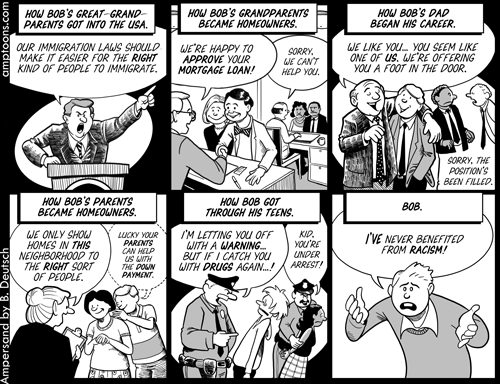In case folks wonder, I definitely didn’t mean this as a reference to Bob Hayes; that it might be read that way didn’t occur to me until two seconds ago, as I started to post the cartoon on “Alas.” I just used “Bob” because it’s a funny-sounding name (see: Black Adder), and because it’s only three letters long and so requires so little word balloon space.
Ironically you could take the standard Republican rant about immigrant violence and just replace the word "immigrant" with "immigration enforcement…




As a Latina who is often perceived as White, I see very clearly some of the ways in which I benefit from racism. When I’m stopped driving at 3 am in my (not great) neighborhood, I get let go with a glance and a warning to take care. That doesn’t make me racist, but it means I benefit from racism.
I don’t think it’s divisive or alienating to point that out, I think it’s essential.
Let’s imagine a world in which there was no racism. In that world, you get go with a glance and a warning, and so do black people and darker skinned Latino/as
In what way is it a benefit to you, not to live in that world?
There are a few problems I see repeatedly in these discussions of privilege.
One is that the people describing privilege often ignore, sometimes to a ridiculous degree, how difficult it can be for a person to understand the advantages they experience without taking into consideration that the people to whom they are speaking are bombarded with images of people who are more privileged than they, and that THAT privilege is highly visible and quite difficult to see around. The impatience many would-be educators have with this is reprehensible, if they really want to explain privilege–they need to be willing to sacrifice some of their self-indulgent superiority and be more compassionate to the suffering these people DO experience. Often you might be explaining privilege to someone who can’t afford health insurance, for instance, and is sitting around terrified because they know perfectly well that they are experiencing symptoms of cancer. I get that someone can have cancer and privilege at the same time, but which issue of privilege do you think is going to loom larger in their mind–the lack of privilege that subjects them to poorer health care than someone who will probably not die of the same cancer, or the possession of privilege that gives them access to better health care so they can die in less pain than someone who can’t even afford to find out if they have cancer?
Another issue is that some of the people describing it simultaneously point out that it’s often invisible, then act indignant when other people say they don’t see it. See the problem? You said it was hard for them to see, then sighed because they haven’t got special trained eyes like you have. You just made them not want to listen to you. I see a lack of patience and sometimes a genuinely ugly sense of self-righteousness in some of the people explaining the concept. And many times when this is pointed out they complain about how tired they are of having to explain it, but always attribute this to the density of the people to whom they’re explaining and never to their inability to effectively communicate what is, essentially, a very simple concept.
And, I repeat, the impatience displayed by those who would like for the privileged to better understand the concept is counter-productive. The supercilious, I’ll just say SNOTTY, tone often employed by so-called socially conscious people blows my mind. If you think that people in the world have a responsibility to try to understand each other, and to show compassion and engage a sense of justice, exhibit those tendencies yourself, or you’re not very convincing. Then you’re part of the problem. You don’t work. You fail, in spite of your amazing vision and understanding, to be relevant to addressing the problem. Being correct doesn’t make you righteous.
And yes, I absolutely do see that privileged people benefit passively and often unknowingly from the effects of discrimination. That’s why I think it’s important for the people who want to talk about it to get the hell off their high horses and be real activists, people who care more about communicating the issue than about communicating their own intelligence. I’m frustrated with people storming around on the internet raging over how stupid other people are, and patting themselves (and other people who speak in the same terminology) on their backs for “getting it.”